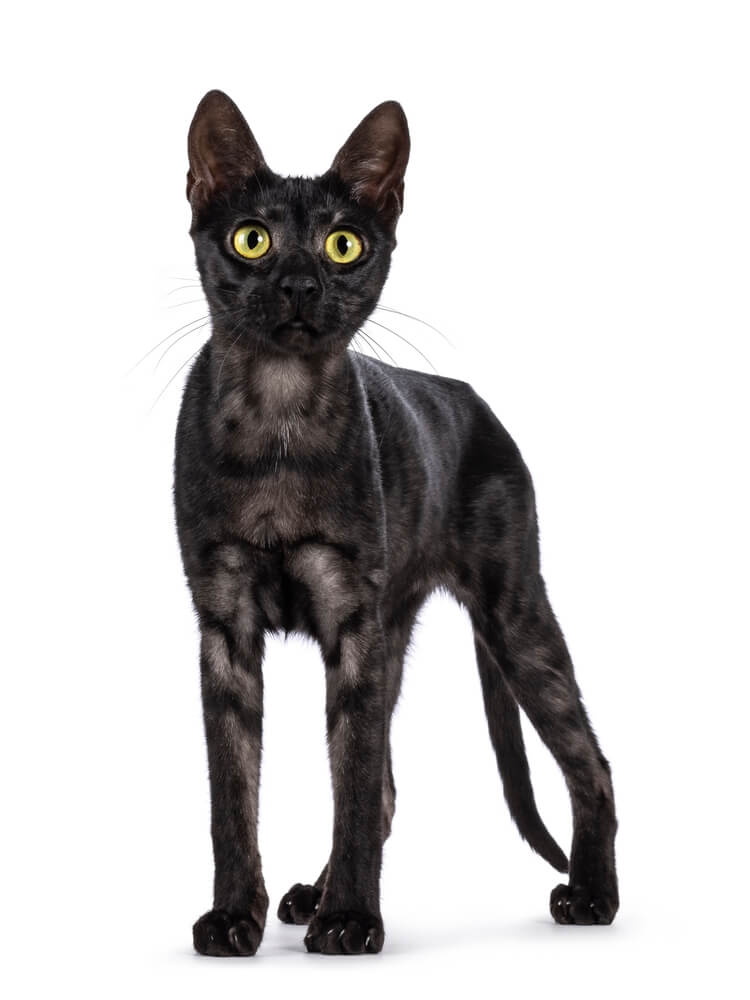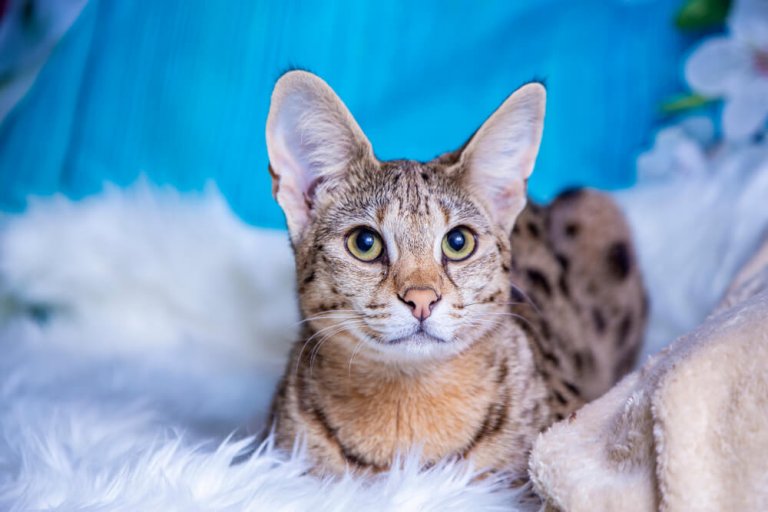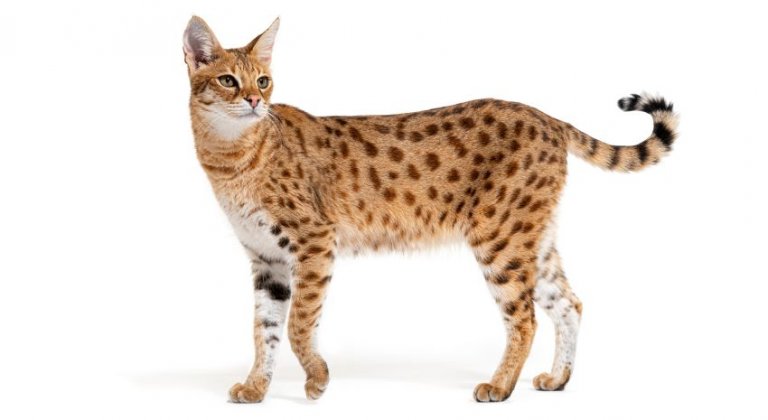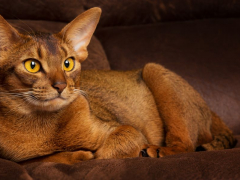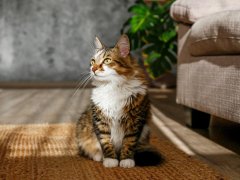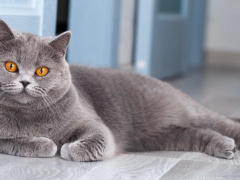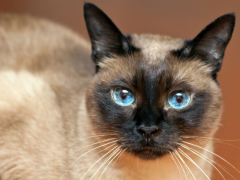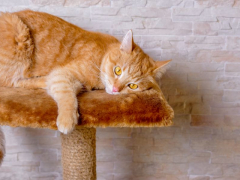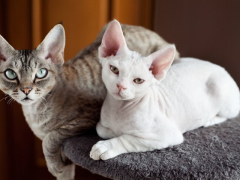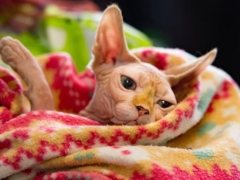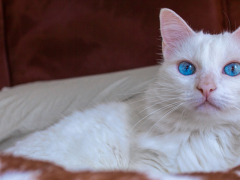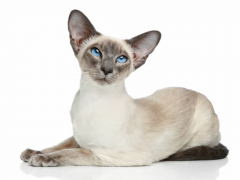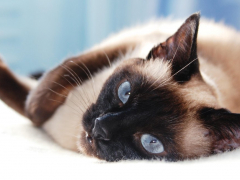Personality and Temperament
Savannah cats get their exotic appearance from the serval, a small African wildcat with stunning spots, long legs, and massive ears. The domestic cat contributes all the wonderful personality traits that make domestic cats such desirable companions.
If there’s one thing you should know about the Savannah cat, it’s this: These cats are typically have an extreme amount of energy, even when they’re several generations along. They do love to settle in for snuggles but their play drive is incredible, and they are also wonderfully intelligent. This means lots of cat proofing is required. Without it, your Savannah cat will happily explore every cupboard and drawer in your house, probably while removing various items for a thorough inspection.
Most cats will go to great lengths to avoid water, but Savannahs are the opposite. An aquarium soon becomes a coveted fishing spot, a koi pond presents an opportunity for swimming (and fishing), and your faucets quickly become favorite playthings. These cats quickly learn how things works, and when given the chance, will hop up onto countertops to activate a stream of water for splashing. Open toilets are fair game, too.
Savannahs can be quite vocal at times, demanding food or attention as the need arises. Their vocabulary ranges from insistent meows to adorable chirps. The odds are good that if you speak to them, they’ll carry on a conversation with you.
If you’re lucky enough to bring a Savannah cat into your family, prepare for daily adventures, and be ready to offer lots of love and patience as your cat learns. Savannah kittens are quite a handful, and adults retain their need for ample activity throughout their lifetimes. We’d love to say that Savannah cats are fantastic for all families, but the truth is, this big, active cat comes with unique needs. Chat with the breeder or rescue you’re considering to make sure that you’re ready to be a cat parent to a Savannah.
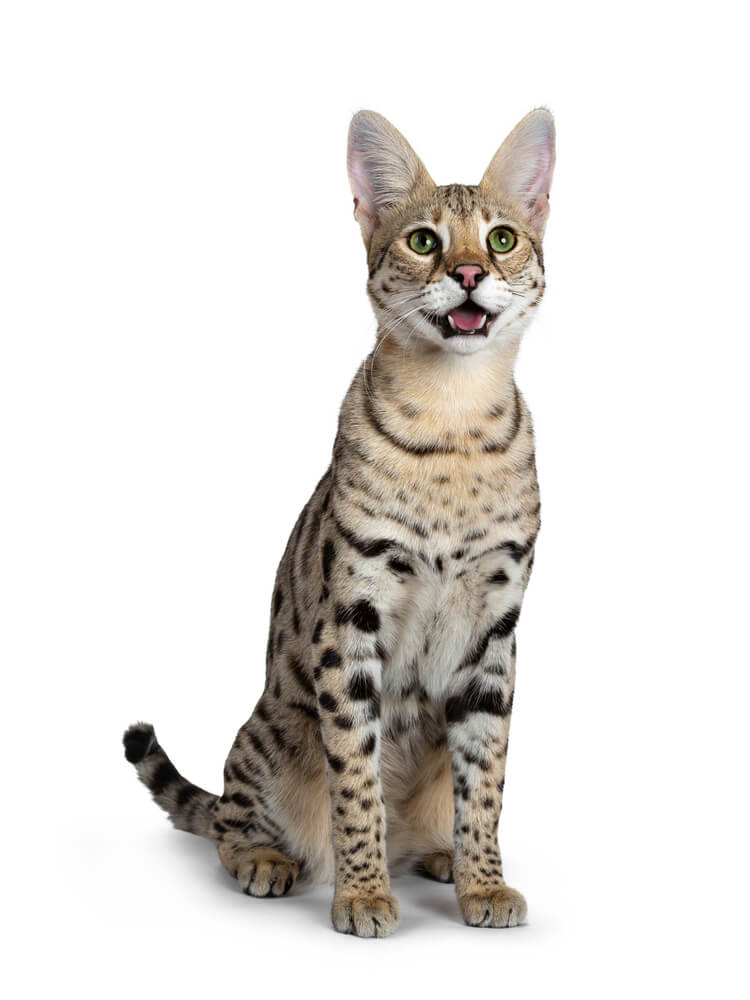
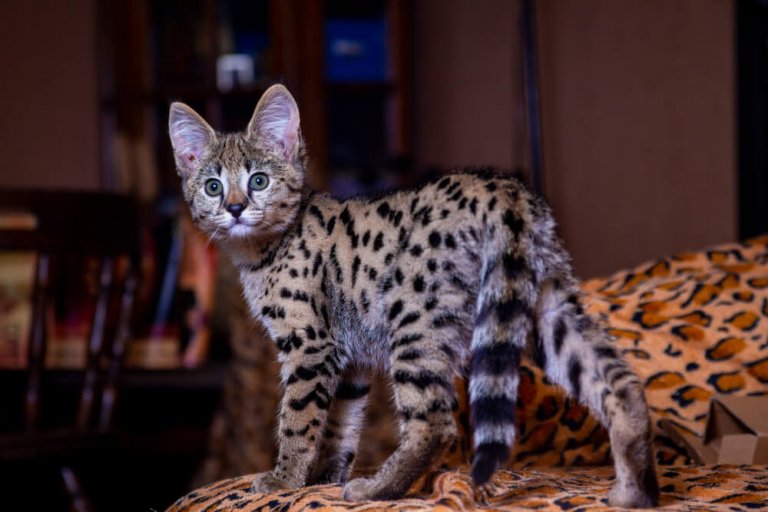
Care
Nutrition
Grooming
Exercise
Health
The closer your Savannah cat is to its serval relative, the wilder their diet needs to be. These cats truly appreciate fresh food—raw diets with proper feline supplementation are often recommended by breeders. Of course, you can also offer a high-quality dry or dehydrated food along with a high-quality wet food. If you do choose a commercial food for your Savannah cat, their diet should be high in protein and low in carbohydrates.
Savannah cats do a fantastic job of keeping their short coats in tip-top shape, so weekly brushing sessions are usually sufficient. Grooming helps to strengthen the bond between you and your cat, and it’s also a fantastic way to remove excess hair before it has a chance to wind up on your furniture. Grooming short haired cats helps to reduce hairballs, too.
Since Savannahs are such large, active cats, it’s a very good idea to teach them to accept nail trims from a young age. Without sharp tips on their claws, these cats are far less likely to damage your belongings or scratch you by accident.
Periodontal disease is a problem for many cats. For this reason (and to help extend the time between professional cleanings) teach your cat to accept daily teeth brushing using a specially shaped brush and pet-safe toothpaste.
Savannah cats can develop destructive behaviors if they’re allowed to become bored, so companionship, safe toys, and plenty of space are absolute essentials. Teach your cat to walk on a leash and harness if you can. Regular walks provide plenty of mental and physical stimulation, and give these friendly cats even more opportunities to socialize.
Treat your Savanna cat to the biggest, best cat tree you can find and consider building them a catio or a similar safe outdoor/semi-outdoor enclosure where they can really stretch out and express their wild side. Window seats are highly appreciated as are durable scratching posts, puzzle toys, and rugged cat toys.
Because Savannah cats are very tough on their toys, you’ll want to avoid anything that’s easy to break or chew apart. Check your cat’s toys frequently to ensure that there are no broken or worn parts that could be swallowed by mistake.
Savannah cats are generally healthy, however they are at risk of two heritable diseases: progressive retinal atrophy (PRA) and pyruvate kinase deficiency (PKD). Responsible Savannah cat breeders try to avoid producing kittens with these diseases by performing genetic testing on their breeding adult cats.
Savannahs are also at a slightly more elevated risk of developing hypertrophic cardiomyopathy (HCM) than cats with a completely domestic background. In addition, most male Savannah cats are sterile until they are six generations removed from their full serval ancestor. This is simply something to be aware of. It isn’t a problem for the cat, and it isn’t an issue for those who are looking for a pet Savannah.
History
The first Savannah cat was the result of an accidental breeding between a Siamese queen owned by Judee Frank and a male serval that Frank was watching for another breeder. The kitten, born in 1986, was named Miracle, but soon after, was re-named “Savannah.”
In 1989, Savannah bred with a Turkish Angora cat. She had three F2 kittens; two lived, and one was stillborn. Savannah subsequently changed hands, finding herself with a breeder named Lori Buchko. Two of her kittens from later breedings were sold to Patrick Kelley, who had seen pictures of Savannah in a 1986 copy of the Long Island Ocelot Club newsletter.
Kelley joined forces with an exotic cat breeder named Joyce Scroufe, who wasn’t at first enthusiastic about the concept of the Savannah cat. Soon, though, word of the new hybrid spread and in 1996, a small group of breeders including Kelley and Scroufe wrote and presented the Savannah cat breed standard to The International Cat Association (TICA).
Four years passed before TICA ended a moratorium on new breeds, and in 2001, the Savannah was accepted for registration only. By October of 2001, the breed advanced to exhibition only status, and soon, Savannah cats were impressing judges at TICA cat shows across the United States.
The Canadian Cat Association accepted the Savannah in 2006 and soon, the breed gained recognition and popularity worldwide. TICA granted the breed Championship status in 2012, allowing Savannah cats to compete against other breeds and further expanding popularity.
